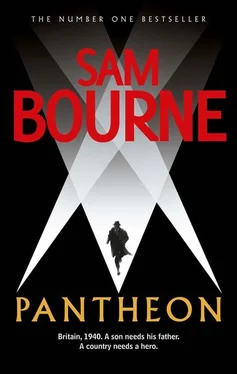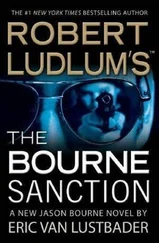Sam Bourne - Pantheon
Здесь есть возможность читать онлайн «Sam Bourne - Pantheon» — ознакомительный отрывок электронной книги совершенно бесплатно, а после прочтения отрывка купить полную версию. В некоторых случаях можно слушать аудио, скачать через торрент в формате fb2 и присутствует краткое содержание. Жанр: Триллер, на английском языке. Описание произведения, (предисловие) а так же отзывы посетителей доступны на портале библиотеки ЛибКат.
- Название:Pantheon
- Автор:
- Жанр:
- Год:неизвестен
- ISBN:нет данных
- Рейтинг книги:3 / 5. Голосов: 1
-
Избранное:Добавить в избранное
- Отзывы:
-
Ваша оценка:
- 60
- 1
- 2
- 3
- 4
- 5
Pantheon: краткое содержание, описание и аннотация
Предлагаем к чтению аннотацию, описание, краткое содержание или предисловие (зависит от того, что написал сам автор книги «Pantheon»). Если вы не нашли необходимую информацию о книге — напишите в комментариях, мы постараемся отыскать её.
Pantheon — читать онлайн ознакомительный отрывок
Ниже представлен текст книги, разбитый по страницам. Система сохранения места последней прочитанной страницы, позволяет с удобством читать онлайн бесплатно книгу «Pantheon», без необходимости каждый раз заново искать на чём Вы остановились. Поставьте закладку, и сможете в любой момент перейти на страницу, на которой закончили чтение.
Интервал:
Закладка:
What was McAndrew’s latest thinking? What was he doing or saying or planning that had got Lund so agitated and so frightened? It had been sufficiently serious that he had been killed to keep it secret. And somehow it involved Florence and Harry.
It was only once he had walked through the grand entrance of the Sterling Library, and was standing in the echoing stone lobby, that James realized he did not know exactly which department he was looking for. Was eugenics to be found in Natural Sciences or in Philosophy? Was it classified as biology or politics? Given the grandiosity of eugenics’ ambition, its desire to be taken seriously as objective, unarguable fact, he headed for the Natural Sciences reading room.
Approaching the librarian, a younger man who looked irritated to be taken away from his own reading, James attempted a smile. ‘I wonder if you can help me. I’m looking for the latest writings of Dr Preston McAndrew. He’s the head of the Medical-’
‘I know who Preston McAndrew is,’ the librarian replied. ‘Books or journals?’
‘Is it possible to look for both?’
The librarian looked up at the clock. ‘I could do that. Come back tomorrow morning, say, any time after eleven o’clock and I’ll-’
‘No, I’m sorry. It really is terribly urgent.’
‘Well, you need to be more specific, sir. Otherwise I can’t help you.’
James said the first thing that came into his head. ‘ The Journal of the American Eugenics Society. The latest edition. Let’s try that.’ That was what Curtis had mentioned, after all. And if McAndrew was going to air his ‘latest thinking’ on eugenics anywhere, it would surely be there.
The librarian looked at him sceptically, but eventually he turned to face the wall of drawers comprising the card index while James paced and paced, checking his watch, looking at the clock, replaying Curtis’s words in his mind, in case he had missed something important.
After much checking and cross-checking, pulling drawers open and closed with exasperated sighs, the librarian returned to the counter. ‘I’m sorry, sir, but that title you requested is currently with another reader.’
Damn. ‘I don’t suppose you could tell me his name, could you? So that perhaps I could see if he’s finished with it?’
The young man glowered, apparently weighing which would be more effort, acceding to this request or denying it and then having to argue over his decision with this troublesome-looking Englishman. He lingered for a moment longer, then went back to the card index and finally to a large ledger. Eventually he returned wearing an expression James had seen many times before. It said, I shouldn’t really be doing this, but…
‘I have the name, but this is rather-’
‘Of course. I’ll be extremely polite.’
‘All right. The book you requested is currently on loan to a reader whose desk number is four hundred and seventy-three. He’s a member of the faculty. His name is Dr George Lund.’
Chapter Thirty-six
As a young man, James had never had much of a poker face. His parents and their Quaker friends were straightforward, honest people and so he had never learned to dissemble. Only at Oxford did he start to understand that the face of the sophisticated man was opaque, but even then he was not much good at it. It was only after Spain that he became adept at hiding his feelings. Which is what he did now, as he showed what he hoped was no response at all to the words he had just heard from the librarian. Instead, he turned around and walked unhurriedly over to the section of the room where the desks were numbered four hundred and above.
So Lund had been down this exact same path just before his death, investigating the Dean and his ‘latest thinking’. James counted the numbers of the desks as he passed them: four hundred and sixty-five, four hundred and sixty-six…
There it was, four hundred and seventy-three. James hesitated before sitting down, feeling a shudder of the dead man’s presence. On the desk were two books, as if their reader had simply stepped away for a cup of coffee. As James sat down, he felt certain: it was something Lund had found in these books that had made him half-crazed with fear — and set him on the path to his death.
James picked up the first volume, which appeared to be an anthology, a series of short papers on eugenics. He flicked through it, turning the pages fast, desperate to find something he might latch onto. Maddeningly, there was neither a contents page nor list of contributors, nor any kind of printing history. Perhaps this was not a published book at all, but rather a collection of monographs that some institution — maybe Yale itself — had bound together.
There was, however, no shortage of familiar names. Indeed, to James’s surprise, most of the authors seemed to be drawn from socialist circles back home. He had heard half of them lecture in person; the other half he had read. Here was George Bernard Shaw, arguing that if democracy were to be saved it would be by a Democracy of Supermen: The only fundamental and possible socialism is the socialization of the selective breeding of man. James skipped over the next bit, picking out only the sentence in which Shaw argued that the overthrow of the aristocrat has created the necessity for the Superman.
There was an editorial from the New Statesman of 1931. The magazine reckoned that the only people who could possibly oppose the eugenic vision were traditionalists and reactionaries, too selfish to see that their desire to have children should take second place to society’s need for an improved breed. Or as the New Statesman put it: The legitimate claims of eugenics are not inherently incompatible with the outlook of the collectivist movement. On the contrary, they would be expected to find their most intransigent opponents amongst those who cling to the individualistic views of parenthood and family economics.
Here was that economist chap, Keynes, whom everyone so admired, putting the case for widespread use of birth control, because the working class was too ‘drunken and ignorant’ to be trusted to keep its own numbers down. And look at this, Grey’s big pal, William Beveridge, Master of University College, arguing that those with ‘general defects’ should be denied not only the vote, but ‘civil freedom and fatherhood’.
Next James came to a short essay by Harold Laski, who had once sat between James and Florence at high table: The time is surely coming in our history when society will look upon the production of a weakling as a crime against itself. And on the very next page, JBS Haldane. Harry Knox was always quoting Haldane, James remembered, chiefly because the eminent scientist and socialist supported the Republic in Spain. Here he was sounding the alarm: Civilization stands in real danger from over-production of ‘undermen’.
James was tearing through the pages now, trying to find a reference to McAndrew or something else that might have caught Lund’s eye. It was as if the dead man were right in front of him, James shaking his corpse, trying to get him to spit out what he had meant to say.
Next there was a paper on the sterilization of those deemed unfit to reproduce, with a long passage on the Brock report on the subject, commissioned by Britain’s health minister in 1934. Apparently the eugenics crowd were delighted that Brock recommended exactly what they had been calling for: a campaign to encourage voluntary sterilization. There was an editorial of warm support from the Manchester Guardian, praising Brock for backing the sterilization ‘the eugenists soundly urge’. On the next sheet was a table of recent statistics, showing which countries were already leading the way. Curtis had been right: Germany apart, the United States was ahead of the pack, having sterilized thirty thousand of the mentally ill and criminally insane by 1939, mostly against their will.
Читать дальшеИнтервал:
Закладка:
Похожие книги на «Pantheon»
Представляем Вашему вниманию похожие книги на «Pantheon» списком для выбора. Мы отобрали схожую по названию и смыслу литературу в надежде предоставить читателям больше вариантов отыскать новые, интересные, ещё непрочитанные произведения.
Обсуждение, отзывы о книге «Pantheon» и просто собственные мнения читателей. Оставьте ваши комментарии, напишите, что Вы думаете о произведении, его смысле или главных героях. Укажите что конкретно понравилось, а что нет, и почему Вы так считаете.












